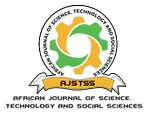Editorial Policy
Editorial Policy
(i) Editorial Board Structure
The Editorial Board of AJSTSS consists of:
-
Editor-in-Chief – Chairperson of the Board with the final authority on all editorial matters.
-
Editorial Board Members – Academics with strong research credentials.
-
Advisory Board Members – Senior experts providing strategic and academic guidance.
Selection Criteria:
-
A PhD (or equivalent) in a relevant subject.
-
A demonstrable publication record in peer-reviewed journals.
-
There is no cap on the number of Editorial Board members.
-
Selection prioritizes international diversity and subject expertise.
(ii) Editorial Responsibilities and Workflow
Manuscript Processing:
-
Initial Screening: Conducted by the Editor-in-Chief to verify:
-
Subject relevance.
-
Article type compliance.
-
-
Plagiarism Check: All manuscripts must pass plagiarism checks with ≤15% similarity.
-
Editor Assignment: Manuscripts are assigned to an Editor based on subject relevance.
-
Editors must declare conflicts of interest and may decline assignments.
-
-
Pre-Review Evaluation: Editors check for:
-
Scope alignment.
-
Originality.
-
Policy compliance.
-
-
Peer Review Process:
-
Manuscripts undergo double-blind peer review.
-
Two reviewers are selected based on expertise.
-
Reviewers receive the manuscript and the AJSTSS Peer Review Form.
-
Review deadline: 14 days.
-
Reviewer Recommendations:
-
Accept as is.
-
Minor revisions.
-
Major revisions.
-
Reject.
Post-Review:
-
Editors evaluate reviewer feedback and make final recommendations.
-
Authors are given:
-
7 days for minor revisions.
-
14 days for major revisions.
-
-
Revised manuscripts may undergo a second review cycle.
-
Editor-in-Chief holds final decision-making authority at any stage.
Editor Duties:
-
Ensure constructive and timely peer review.
-
Communicate Journal expectations clearly to reviewers.
-
Attend periodic Editorial Board meetings.
-
Uphold confidentiality and ethical guidelines.
(iii) Code of Conduct
-
Conflict of Interest: Editors must recuse themselves from any conflicted assignments.
-
Objectivity and Fairness: All manuscripts are treated impartially.
-
Transparency: Prompt communication and decision-making.
-
Confidentiality: Identities of authors and reviewers are strictly protected.
-
Service to Authors: Editors must ensure:
-
Timely correspondence.
-
Respectful communication.
-
Editorial continuity during staff absences.
-
-
Publication Ethics:
-
Editorial Board members, including the Editor-in-Chief, may publish in the Journal, but such publications must be limited to preserve diversity of authorship.
-
No part of a reviewed manuscript should be used by Editors or Reviewers in any form.
-
(iv) Peer Review Policy
Double-Blind Process:
-
Both author and reviewer identities are concealed.
-
Each manuscript is reviewed by two independent experts.
Reviewer Expectations:
-
Must have subject expertise.
-
Must respect deadlines (14 days max).
-
Must maintain strict confidentiality.
-
Feedback must be:
-
Clear.
-
Objective.
-
Logically justified.
-
-
Reviewer recommendations:
-
Accept.
-
Accept with minor/major revisions.
-
Reject (with justification).
-
Special Notes:
-
Reviewers may suggest referees, but final reviewer decisions rest with the Editorial Board.
-
Failure to revise in time may lead to rejection.
-
Editors and reviewers must never exploit or disclose manuscript content.

